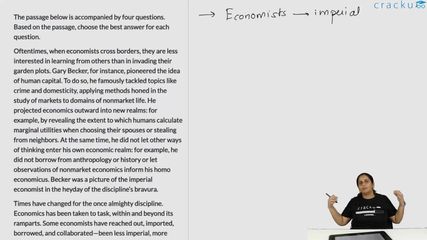Sign in
Please select an account to continue using cracku.in
↓ →
The passage below is accompanied by four questions. Based on the passage, choose the best answer for each question.
Oftentimes, when economists cross borders, they are less interested in learning from others than in invading their garden plots. Gary Becker, for instance, pioneered the idea of human capital. To do so, he famously tackled topics like crime and domesticity, applying methods honed in the study of markets to domains of nonmarket life. He projected economics outward into new realms: for example, by revealing the extent to which humans calculate marginal utilities when choosing their spouses or stealing from neighbors. At the same time, he did not let other ways of thinking enter his own economic realm: for example, he did not borrow from anthropology or history or let observations of nonmarket economics inform his homo economicus. Becker was a picture of the imperial economist in the heyday of the discipline’s bravura.
Times have changed for the once almighty discipline. Economics has been taken to task, within and beyond its ramparts. Some economists have reached out, imported, borrowed, and collaborated—been less imperial, more open. Consider Thomas Piketty and his outreach to historians. The booming field of behavioral economics—the fusion of economics and social psychology—is another case. Having spawned active subfields, like judgment, decisionmaking and a turn to experimentation, the field aims to go beyond the caricature of Rational Man to explain how humans make decisions….
It is important to underscore how this flips the way we think about economics. For generations, economists have presumed that people have interests—“preferences,” in the neoclassical argot—that get revealed in the course of peoples’ choices. Interests come before actions and determine them. If you are hungry, you buy lunch; if you are cold, you get a sweater. If you only have so much money and can’t afford to deal with both your growling stomach and your shivering, which need you choose to meet using your scarce savings reveals your preference.
Psychologists take one look at this simple formulation and shake their heads. Increasingly, even some mainstream economists have to admit that homo economicus doesn’t always behave like the textbook maximizer; irrational behavior can’t simply be waved away as extraeconomic expressions of passions over interests, and thus the domain of other disciplines…. This is one place where the humanist can help the economist. If narrative economics is going to help us understand how rivals duke it out, who wins and who loses, we are going to need much more than lessons from epidemiological studies of viruses or intracranial stimuli.
Above all, we need politics and institutions. Shiller [the Nobel prize winning economist] connects perceptions of narratives to changes in behavior and thence to social outcomes. He completes a circle that was key to behavioral economics and brings in storytelling to make sense of how perceptions get framed. This cycle (perception to behavior to society) was once mediated or dominated by institutions: the political parties, lobby groups, and media organizations that played a vital role in legitimating, representing, and excluding interests. Yet institutions have been stripped from Shiller’s account, to reveal a bare dynamic of emotions and economics, without the intermediating place of politics.
Option C is the correct answer.
The author critiques Schiller for focusing on the direct relationship between emotions, perceptions, and behaviour while excluding the mediating role of institutions such as political parties, media organizations, and lobby groups. The passage states that these institutions historically played a vital role in framing perceptions and legitimizing interests, which Schiller’s narrative leaves out.
Option A: The passage suggests that media and politics are key intermediaries in shaping perceptions and behaviour and not a marginal role.
Option B: The passage does not suggest that Shiller actively denigrates or diminishes the role of institutions. The issue is his omission of institutions, not his critique of their importance.
Option D: The passage mentions that storytelling is part of Schiller’s approach but does not critique him for relying excessively on it. The critique is about the exclusion of institutions, not the use of storytelling.

Click on the Email ☝️ to Watch the Video Solution
Create a FREE account and get:
Educational materials for CAT preparation